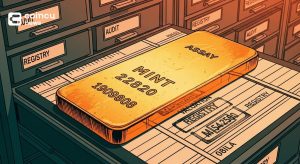SEC Cracks Down On Crypto Fraud: 18 Defendants Charged In DEBT Box Scandal
Key Points:
- SEC freezes assets of crypto mining firm over alleged fraud.
- DEBT Box was accused of selling unregistered securities with false promises of cryptocurrency mining profits.
- 18 defendants were charged and accused of misappropriating funds for personal use.
The U.S. Securities and Exchange Commission (SEC) has taken decisive action against Digital Licensing Inc., a Utah-based crypto mining company, for its alleged involvement in fraudulent activities. The commission announced an emergency asset freeze and obtained a restraining order against the company, which operates under the name DEBT Box.

According to the charges, DEBT Box and its four principals, including Jason Anderson, Jacob Anderson, Schad Brannon, and Roydon Nelson, along with 13 other defendants, orchestrated a scheme that began in March 2021. They allegedly targeted hundreds of U.S. investors, raising a substantial sum of approximately $50 million by selling unregistered securities known as “node licenses.”
Investors were misled into believing that these licenses would facilitate cryptocurrency mining, promising potential increases in value over time. However, the truth was that the defendants were merely generating the cryptocurrency instantly using blockchain code, as revealed by the commission.
Tracy S. Combs, Director of the SEC’s Salt Lake Regional Office, expressed outrage at the defendant’s actions, accusing them of deceptive practices:
“We allege that DEBT Box and its principals lied to investors about virtually every material aspect of their unregistered offering of securities, including by falsely stating that they were engaged in crypto asset mining,” Combs stated.
The complaint further claimed that the defendants misappropriated the raised funds for personal gains, including purchasing luxury vehicles and homes, extravagant vacations, and lavishing themselves and their acquaintances with cash.

DEBT Box had purportedly propagated its fraudulent scheme through numerous online videos, social media posts, and events, falsely assuring investors of massive gains from their crypto mining endeavors. The SEC, however, asserted that the so-called “node licenses” were nothing more than a deceptive front.
In total, the commission charged 18 defendants for their involvement in the sale of unregistered securities offerings. The emergency asset freeze and restraining order come as the regulatory authorities ramp up efforts to protect investors from potential crypto-related scams and fraudulent activities.
DISCLAIMER: The information on this website is provided as general market commentary and does not constitute investment advice. We encourage you to do your own research before investing.





















